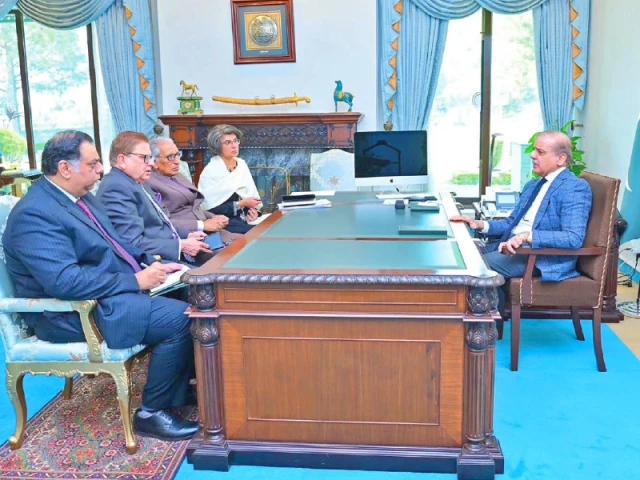PM backs diplomacy to mend Afghan ties
Cross-border attacks intolerable: Shehbaz Briefed on envoy's Kabul talks Ambassador shares Taliban's perspecti

Prime Minister Shehbaz Sharif on Monday gave the go-ahead to Pakistan's trouble shooter for Afghanistan to continue pursuing diplomacy in order to resolve issues with the neighbouring country.
However, the prime minister made it clear that Pakistan would not hesitate to act if terrorists operating from across the border threaten the country's security, according to sources familiar with the development.
The prime minister was given a detailed briefing by Pakistan's Special Representative for Afghanistan Ambassador Muhammad Sadiq on his recent visit to Kabul. Foreign Secretary Amna Baloch and Prime Minister's Special Assistant Tariq Fatemi were also in attendance.
No details of the meeting were provided, officially. Ambassador Sadiq said on his X account that he briefed the prime minister about his recent visit to Afghanistan. The Prime Minister's Office also issued a similar statement.
Ambassador Sadiq was the first senior Pakistani official to visit Kabul after a gap of over 15 months. As terrorist attacks increased from across the border in Pakistan, Islamabad had virtually severed contacts with Kabul. His visit was part of renewed efforts by Pakistan to reset the troubled relationship.
Leading a delegation, Sadiq held talks with senior Taliban leaders, including Interior Minister Sirajuddin Haqqani, Foreign Minister Amir Khan Muttaqi and others. The sources said Ambassador Sadiq informed the prime minister about his engagements in Kabul and the perspective of the Taliban leadership.
The visit of Ambassador Sadiq was, however, marred by tensions between the two countries. He was in Kabul when allegation surfaced that Pakistan conducted air strikes inside Afghanistan, targeting the terrorist hideouts of the banned Tehreek-e-Taliban Pakistan (TTP).
Islamabad officially did not confirm the strikes, instead emphasised that intelligence-based operation (IBO) was carried out in the border areas. Two days later, Pakistan and Afghan Taliban forces exchanged fire along the border.
The Taliban claimed that they carried out strikes to avenge the Pakistan air strikes, while Pakistan insisted that the TTP along the Afghan forces tried to make infiltration attempts. After two days of intense exchange of fire, guns fell silent on Sunday as a result of both sides activating the diplomatic channels to lower the tensions.
According to sources, Ambassador Sadiq, during his interactions with the Taliban officials, told them about the importance of addressing Pakistan's concerns regarding the terrorist hideouts.
The Taliban, according to the sources, claimed that they were not encouraging the TTP to attack Pakistan. However, the Pakistani side told them that Kabul would have to take decisive steps to neutralise the terror threat emanating from their soil.
Prime Minister Shehbaz had recently stated that any cross-border terrorist attacks would be deemed as Pakistan's red line. He had insisted that the Taliban should make a clear choice between Pakistan and the TTP.
The sources said that despite simmering tensions between the two countries, Pakistan was still seeking a solution through diplomacy. However, for diplomacy to succeed, the Taliban would have to make sure that terrorists were not given a free hand in Afghanistan.



















COMMENTS
Comments are moderated and generally will be posted if they are on-topic and not abusive.
For more information, please see our Comments FAQ